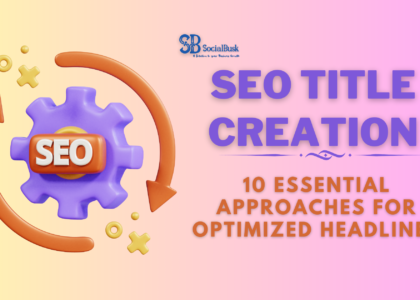The Role of SEO in E-commerce Websites
Introduction
In today’s digital age, having an online presence is paramount for any business, and this rings especially true for e-commerce websites. The competition in the e-commerce industry is fierce, and to stand out, you need to ensure your website is easily discoverable by potential customers. This is where Search Engine Optimization (SEO) comes into play. In this article, we’ll delve into the importance of SEO for e-commerce websites and how it can significantly impact your online success.
Chapter 1: Understanding SEO
Before we dive into why SEO is essential for e-commerce, let’s start with the basics. SEO, or Search Engine Optimization, is the practice of optimizing your website to rank higher in search engine results pages (SERPs). The ultimate goal is to increase organic (non-paid) traffic to your site. SEO involves various strategies and techniques, including:
1.1. Keyword Research: Identifying the most relevant and high-performing keywords in your industry.
1.2. On-Page SEO: Optimizing your website’s content, meta tags, and headings to align with target keywords.
1.3. Off-Page SEO: Building high-quality backlinks and citations from reputable websites to boost your site’s authority.
1.4. Technical SEO: Ensuring your website’s structure and coding are search engine-friendly for better crawlability and indexing.
Chapter 2: The E-commerce Advantage
Now that we’ve covered the basics of SEO, let’s explore how it specifically benefits e-commerce websites.
2.1. Increased Visibility
The primary aim of SEO is to enhance your website’s visibility on search engines like Google. When your e-commerce site ranks higher in search results, it becomes more accessible to potential customers. This increased visibility can lead to a higher click-through rate (CTR) and, subsequently, more conversions.
2.2. Targeted Traffic
SEO allows you to target specific keywords and phrases related to your products or services. This means that the traffic your website attracts is more likely to be interested in what you offer. As a result, the chances of converting these visitors into paying customers are significantly higher.
2.3. Improved User Experience
Optimizing your e-commerce website for SEO often involves enhancing the user experience. This includes improving site speed, mobile-friendliness, and overall usability. A seamless and user-friendly website not only ranks better but also keeps visitors engaged, ultimately leading to higher sales.
Chapter 3: The Power of Keyword Research
One of the fundamental aspects of SEO for e-commerce is keyword research. This process involves identifying the keywords and phrases that potential customers use when searching for products online.
3.1. Long-Tail Keywords
In the world of e-commerce, long-tail keywords are a game-changer. These are longer, more specific keyword phrases that cater to niche products. While they may have lower search volumes, they often lead to higher conversion rates because they target users with a clear intent to purchase.
3.2. Competitive Advantage
Through thorough keyword research, you can uncover opportunities that your competitors may have missed. By targeting less competitive keywords with high conversion potential, you can gain an edge in your market.
Chapter 4: Content is King
Content plays a pivotal role in SEO for e-commerce websites. High-quality, informative, and engaging content can have a significant impact on your website’s search engine rankings.
4.1. Product Descriptions
Craft compelling product descriptions that not only describe your products but also answer potential customer questions. This not only helps with SEO but also improves the shopping experience.
4.2. Blogging
Maintaining a blog can be an effective SEO strategy for e-commerce websites. By creating relevant and valuable content, you can attract organic traffic and establish your site as an authority in your niche.
Chapter 5: The Mobile Revolution
With the increasing use of smartphones, mobile optimization is no longer optional. Google considers mobile-friendliness as a ranking factor, and a responsive design can significantly impact your SEO efforts.
5.1. Mobile-Friendly Design
Ensure that your e-commerce website is responsive and provides an excellent user experience on mobile devices. This not only benefits SEO but also caters to the growing number of mobile shoppers.
Chapter 6: The Link-Building Puzzle
Off-page SEO, particularly link building, is a crucial aspect of SEO for e-commerce websites.
6.1. Quality Backlinks
Earning high-quality backlinks from authoritative websites in your industry can boost your site’s credibility and improve its rankings. However, focus on quality over quantity.
6.2. Citations
Consistent and accurate business citations across the web can enhance your local SEO efforts, especially if you have a physical store in addition to your online presence.
Conclusion
In the highly competitive world of e-commerce, SEO is not just a beneficial strategy; it’s an absolute necessity. By optimizing your website for search engines, you can increase visibility, attract targeted traffic, and ultimately boost sales.
To take your e-commerce SEO to the next level, consider consulting with experts who can provide tailored guidance for your specific business. Feel free to book a call with our SEO experts or visit our website at socialbusk.com to learn more about how we can help you achieve e-commerce success through SEO.
Don’t underestimate the power of SEO in making your e-commerce venture thrive. Embrace it, invest in it, and watch your online store reach new heights.





